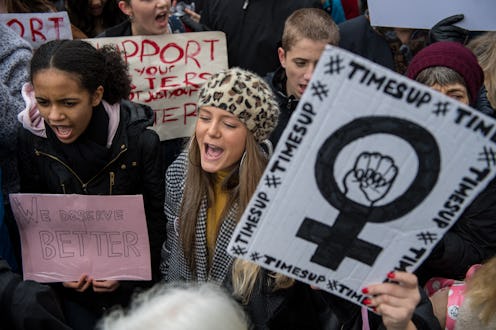
With more and more people telling their stories of sexual assault and harassment, it's important to ask ourselves how we can fight rape culture so that these things stop happening. That means not only pushing for large-scale reforms like better consent education and examining sexual assault laws but also looking at how we practice consent in our own lives. This is the topic of The New York Times' "Navigating Sex in the Gray Zone," a series of essays that explore how people communicate in their sexual interactions and go about relationships in the #MeToo era.
The paper is accepting submissions from college students worldwide about "gray" sexual experiences through Sunday, March 11. "We want to hear how you handle consent for sexual intimacy in relationships and encounters," its website reads. "Do you have a particular experience you find yourself thinking back to? What was said, texted or hinted at, through words or physical cues, that moved the encounter forward — or stopped it? How did it make you feel at the time, and how do you think about it now?"
The New York Times Gender Initiative and Modern Love created the series in response to conversations happening around the Aziz Ansari allegations, The New Yorker's fictional story "Cat Person," and other stories that started debates around consent.
"[...] some of the more recent stories — like Aziz Ansari [allegations] or even “Cat Person,” the fictional account in The New Yorker — are cracking open an equally important conversation: about the ambiguity of sexual culture that surrounds those clear-cut cases," New York Times gender editor Jessica Bennett tells Bustle. "And it is possible to not just be as simple as he-said, she-said, but — in instances where clear communication is not happening — it’s he-thought, she-thought (or she-thought, she-thought, and so on)."
The series centers on college students because many recent conversations about sexual misconduct have been happening on campuses, Modern Love editor Daniel Jones tells Bustle. That's largely because, unfortunately, campuses are also where the misconduct itself is often happening. The 2015 Association of American Universities Campus Climate Survey found that 33.1 percent of women, 39.1 percent of TGQN (transgender, genderqueer, questioning, or non-conforming) people, and 8.6 percent of men in their senior year of college had been victims of non-consensual sexual contact.
Part of the problem is that many people haven't learned about consent or sexual assault prevention. A 2015 Washington Post poll found that 18 percent of college students think someone has consented to sex as long as they haven't said "no." But according to the principle of affirmative consent, which has become a part of many colleges' policies and even some state laws, someone has not agreed to sex unless they've said "yes."
"Even in the students' stories we have received so far, there is a lot of basic confusion over what constitutes harassment, assault, even rape," says Jones. "I think the more this gets brought out into the open, the better off we'll be going forward."
Jones hopes the series will become a jumping-off point to talk productively about how to have more ethical sexual encounters. "It's such an emotional and politically charged issue that conversation itself sometimes feels too risky," he says. "Which is why basic storytelling is so important. It can be easier, and more instructive, to offer a story than to express an opinion."
"I also think we need to talk not just about the acts themselves, but about the culture that surround those acts, and the way that gender dynamics influences them. ... I keep wondering to what extent should we be rethinking how we teach men to be 'men' at all, and for women, talking not just about being able to communicate our desires out loud, but being in touch with them at all," says Bennett. "I think we can take a cue from college students, who are having some of the most robust conversations about this in a way that is wildly more nuanced than anything my generation or that of my parents’ generation has had. The challenge, of course, is taking these really complicated concepts like 'affirmative consent' and bringing them into the mainstream."
To add to this conversation, college students ages 18 or over are invited to submit their essays through 11:59 p.m. ET on March 11 here.